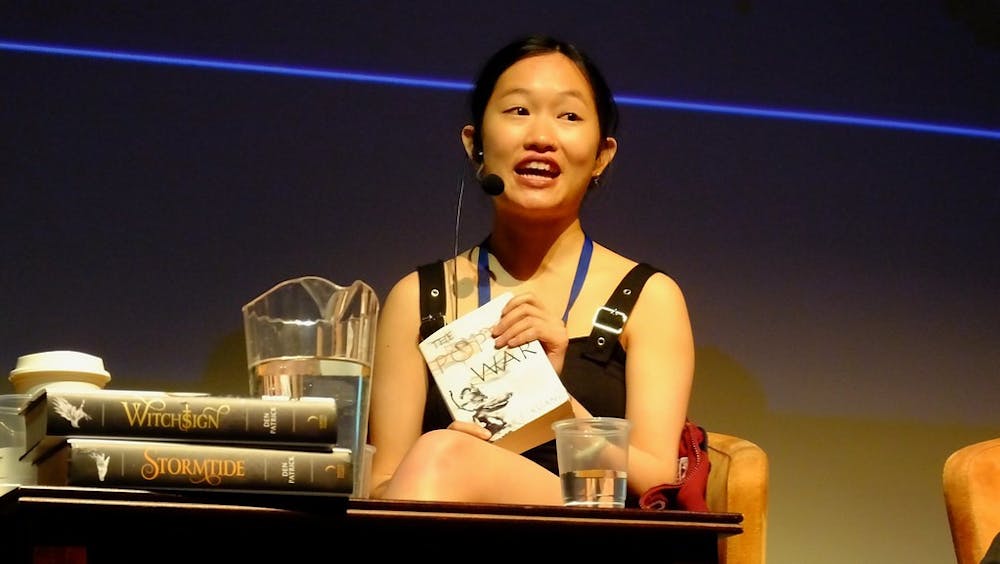There are many things that can define a person’s identity: ethnicity, family and intrinsic values. Ever since I could remember, I knew exactly what the core parts of my essence were. I knew that above all, I was a student — an academic. Breathing life into books and reveling in research came as second nature to me. So, the day I discovered R.F. Kuang was the day that I thought I met my literary soulmate.
Best-selling author and Crawford Awardee R.F. Kuang has always had a special place in my heart. Her identity as an Asian American and her unquenchable passion for academia matched my own, and I knew that if her books could swallow me whole, I would have let them.
When Katabasis was announced in 2023, the idea of a hellish journey based on mythology (with heavy references to some of my favorite classics and philosophers) made me giddy with joy. I counted down the seconds until the book was released, hiding outside of Greedy Reads until August 26 hit and the doors opened.
While the book met some of my expectations, I felt my passion dwindle upon further reading. Critiques that I had for Kuang’s previous works — such as her tendency to overexplain themes and her hypocrisy in critiquing academia while simultaneously indulging in its elitism — trickled into her newest novel, and my qualms with her artistry were, sadly, carried over rather than resolved.
Katabasis is a novel that follows Alice Law and Peter Murdoch, PhD candidates in the field of magic, journeying to rescue their advisor, Jacob Grimes, from Hell. Throughout their journey, we meet a slew of characters reminiscent of Dante’s Inferno, the style of the story framed as an academic paper adorned with footnotes, diagrams and many references, as the world of Hell itself is characterized as Cambridge University’s campus.
The most persistent issue lies in the handling of narrative pacing. Kuang’s characters suffer from her tendency to overexplain and bombard with exposition. Though their voices are distinct, they often function less as living figures and more as vehicles for philosophical discourse. In many ways, Kuang excels at constructing allegorical figures in which her protagonists embody ideas as much as personalities. However, this strength becomes a weakness when it undermines the emotional stakes.
Law is a deeply flawed student who is obsessed with achieving greatness; her character symbolizes the dangers of unchecked ambition. Peter Murdoch serves as her foil: He is a person who is naturally intelligent, spared from the heightened expectations that academia often imposes on minorities.
This difference between characters was mirrored in the disjointed narrative. The structure was too direct for my enjoyment. There was no surprise or anticipation with the descent through Hell. Rather than unfolding as an unpredictable odyssey, the descent read like an itinerary. The novel loses its sense of urgency, with descriptions of the characters walking across the dunes between each court, dragging on about philosophical takes rather than fighting toward their goal.
This goes hand-in-hand with the following critique that the world of Hell is not dangerous. Reading the story makes me feel as though no real stakes were propelling the story forward. While the Kripkes (a pair of amoral magicians that serve as the antagonists) served as a threat of death for both characters, they are technically a source of danger that is not a true part of Hell.
Not only this, but material obstacles rarely persist beyond a single chapter before dissolving without lasting impact on the characters. For instance, the daunting climb over the wall dividing the limbo of the underworld from the true hellscape occupies only one chapter and is quickly forgotten thereafter without much lasting impact on the characters. If the story claims that Hell is so dangerous that it is difficult to escape, why do the characters traverse the terrain as if they were strolling on a real college campus?
The frequent critique that Kuang’s social and political commentary is too “on the nose” stems from a similar tension. Her allegories leave little to the imagination, and this novel makes certain that no symbolic meaning is left unturned. While this directness does feel heavy-handed and strips the reader of interpretive agency, it more so reflects a reality of contemporary literary culture. It demonstrates that, in an era of oversimplification and distraction, subtlety risks going unnoticed.
Within the story, there is an interaction between Law and a female professor, Helen Murray, where Law’s idea of feminism (as self-serving) is dismantled. The exchange is illustrative of Kuang’s tendency to insert sociopolitical critique directly into the dialogue rather than weaving it into the narrative. While Murray critiques Law’s vision of feminism as shallow, claiming that Law cannot just take refuge in feminism when it suits her, this commentary is reflective less of character growth than of Kuang’s authorial intervention. Rather than deepening the complexity of Law’s identity in an unpredictable direction, the scene is a direct insertion of theory that breaks the illusion of narrative flow.
Kuang’s Hell is more of a veneer than a place of stakes and wonder. The Chinese deities, “analytic magick” and elaborate footnotes all demonstrate erudition, but they fail to evoke true mystery, wonder or emotional engagement. Fantasy should reach for the realm of the inexplicable, and Katabasis falls short.
In this, Katabasis is both a triumph and a limitation. It succeeds as an intellectual project while stumbling as a work of emotional fiction. For me, the novel was less of a mirror of my own academic hunger but a reminder of its costs. Kuang continues to write with rigor and unflinching political insight, but in Katabasis, the balance tips toward thesis rather than story. As an academic, I admire her brilliance. However, as a lover of literature, I am left wishing that the fire of narrative matched her critiques.





